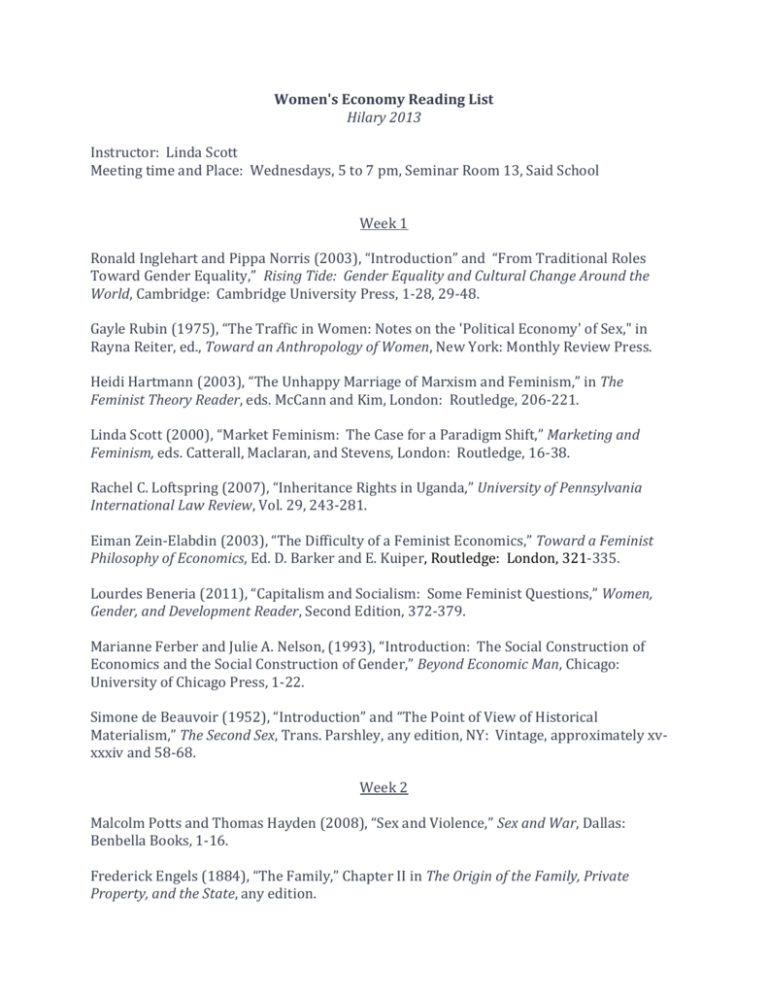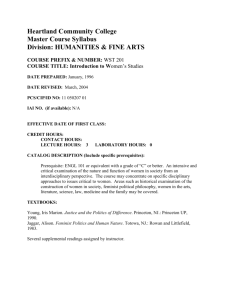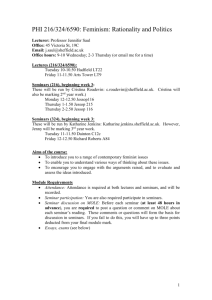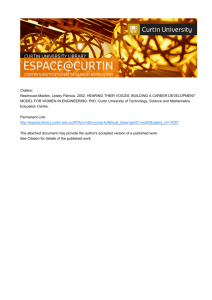2013WomensEconomyReadinglist
advertisement

Women's Economy Reading List Hilary 2013 Instructor: Linda Scott Meeting time and Place: Wednesdays, 5 to 7 pm, Seminar Room 13, Said School Week 1 Ronald Inglehart and Pippa Norris (2003), “Introduction” and “From Traditional Roles Toward Gender Equality,” Rising Tide: Gender Equality and Cultural Change Around the World, Cambridge: Cambridge University Press, 1-28, 29-48. Gayle Rubin (1975), “The Traffic in Women: Notes on the 'Political Economy' of Sex," in Rayna Reiter, ed., Toward an Anthropology of Women, New York: Monthly Review Press. Heidi Hartmann (2003), “The Unhappy Marriage of Marxism and Feminism,” in The Feminist Theory Reader, eds. McCann and Kim, London: Routledge, 206-221. Linda Scott (2000), “Market Feminism: The Case for a Paradigm Shift,” Marketing and Feminism, eds. Catterall, Maclaran, and Stevens, London: Routledge, 16-38. Rachel C. Loftspring (2007), “Inheritance Rights in Uganda,” University of Pennsylvania International Law Review, Vol. 29, 243-281. Eiman Zein-Elabdin (2003), “The Difficulty of a Feminist Economics,” Toward a Feminist Philosophy of Economics, Ed. D. Barker and E. Kuiper, Routledge: London, 321-335. Lourdes Beneria (2011), “Capitalism and Socialism: Some Feminist Questions,” Women, Gender, and Development Reader, Second Edition, 372-379. Marianne Ferber and Julie A. Nelson, (1993), “Introduction: The Social Construction of Economics and the Social Construction of Gender,” Beyond Economic Man, Chicago: University of Chicago Press, 1-22. Simone de Beauvoir (1952), “Introduction” and “The Point of View of Historical Materialism,” The Second Sex, Trans. Parshley, any edition, NY: Vintage, approximately xvxxxiv and 58-68. Week 2 Malcolm Potts and Thomas Hayden (2008), “Sex and Violence,” Sex and War, Dallas: Benbella Books, 1-16. Frederick Engels (1884), “The Family,” Chapter II in The Origin of the Family, Private Property, and the State, any edition. Alison M. Jaggar (1983), “Radical Feminism and Human Nature,” Chapter 5, Feminist Politics and Human Nature, New York: Rowman and Littlefield, 83-122. Simone de Beauvoir (1952), “Part II: History,” The Second Sex, Trans. Parshley, any edition, NY: Vintage, approx. 69-155. Gerda Lerner (1986), The Creation of Patriarchy, Oxford: Oxford University Press. Week 3 Paula England (1993), “The Separative Self: Androcentric Bias in Neoclassical Assumptions,” Beyond Economic Man, eds. Ferber and Nelson, Chicago: University of Chicago, 37-53. Alison M. Jaggar (1983), “Liberal Feminism and Human Nature,” Chapter 3, Feminist Politics and Human Nature, New York: Rowman and Littlefield, 27-50. Michele A. Pujol (2003), “Into the Margins!” Toward a Feminist Philosophy of Economics, Ed. D. Barker and E. Kuiper, Routledge: London, 22-35. Julie Nelson (1993), “The Study of Choice or the Study of Provisioning? Gender and the Definition of Economics,” Beyond Economic Man, Eds. Ferber and Nelso, Chicago: University of Chicago, 23-36. Nancy Folbre (2009), Greed, Lust, and Gender, Oxford: OUP. Week 4 Marilyn Power, Ellen Mutari, and Deborah M. Figart (2003), “Beyond Markets: Wage Setting and The Methodology of Feminist Political Economy,” Toward a Feminist Philosophy of Economics, Ed. D. Barker and E. Kuiper, Routledge: London, 70-85. Alison M. Jaggar (1983), “Traditional Marxism and Human Nature,” Chapter 4, Feminist Politics and Human Nature, New York: Rowman and Littlefield, 51-82. Michael Goldberg (2000), “Breaking New Ground,” No Small Courage: A History of Women in the United States, Oxford: OUP, 179-236. Elson, Diane and Ruth Pearson, “The Subordination of Women and the Internationalization of Factory Production,” Women, Gender, and Development Reader, Second Editon, N. Visvanathan, L. Duggan, N. Wiegersma, and L. Nisonoft, eds., NY: Palgrave, 212-224. Fernandez-Kelly, Maria Patricia (1997, 2011), “Maquiladoras: The View from the Inside,” The Women, Gender, and Devlopment Reader, 2nd Edition, N. Visvanathan, L. Dugga, N. Wiegersma, and L. Nisonoft, New York: Palgrave, 212-224. Elizabeth Wayland Barber (1996), Women’s Work: The First 20,000 Years, London: WW Norton. Week 5 Alison M. Jaggar (1983), “Socialist Feminism and Human Nature,” Chapter 4, Feminist Politics and Human Nature, New York: Rowman and Littlefield, 123-168. Kevin Bales (1999), “The New Slavery” and “Thailand: Because She Looks Like a Child,” Disposable People, London: University of California Press, 1-33, 34-80. Martha C Nussbaum (1999), Sex and Social Justice, Oxford: Oxford University Press. Week 6 Leta Hollingsworth (1916), "Social devices for impelling women to bear and rear children" American Journal of Sociology, Volume 22, No. 1. Reprinted in: POPULATION AND DEVELOPMENT REVIEW. 2000 Jun; 26(2): 353-63. Susan Strasser (1982), “Fetch a Pail of Water,” “Blue Monday,” “A Stitch in Time,” Never Done: A History of American Housework, New York: Henry Holt, 85-103, 104-124, 125-144. Betty Friedan (1963), “The Problem that Has No Name” and “The Sexual Sell,” The Feminine Mystique, any edition, approximately 5-20 and 166-189. Michael J. Silverstein and Kate Sayre (2009), “The Female Economy,” Harvard Business Review, September, 2-9. Badinter, Elisabeth (2010), “Wombs on Strike,” The Conflict: How Modern Motherhood Undermines the Status of Women, NY: H. Holt, 131-153. Barbara Ehrenreich and Arlie Hochschild (1997, 2011), “Global Woman,” Women, Gender, and Development Reader, 2nd Edition, N. Visvanathan, L. Dugga, N. Wiegersma, and L. Nisonoft, New York: Palgrave 237-244. Jessica Valenti (2012), “Introduction,” “Giving Up Parenthood,” “Smart Women Don’t Have Kids,” Why Have Kids? A New Mom Exposes the Truth about Parenting and Happiness, Amazon publishing, ix-xx, 95-108, 121-133. Rosemary Crompton (2006), Employment and the Family, Cambridge: Cambridge University Press. Week 7 Karen Hughes (2005), “Women’s Paths into Self-Employment and Small Business,” :”’I Love What I Do’: Creation of Job Satisfaction and Meaningful Work,” “Players or Paupers? Income, Job Security, and Negotiation of Risk,” Female Enterprise in the New Economy, Toronto: University of Toronto Press, 41-74, 75-111, 112-147. Nancy Carter and Christine Silva (2010), “Women in Management: Delusions of Progress, Harvard Business Review, March. Sarah Rutherford (2011), Women's Work, Men's Cultures, New York: Palgrave MacMillan. Week 8 Sylvia Ann Hewlett and Ripa Rashid (2011), “Part One: The Changing Face of Talent,” Winning the War for Talent in Emerging Markets, Boston: Harvard Business Review Press, 15-56. Sylvia Ann Hewlett, Part One, Off-Ramps and On-Ramps: Keeping Talented Women on the Road to Success, Boston: Harvard Business Review Press, 3-114. Hannah Rosin (2012), The End of Men, New York: Viking.










